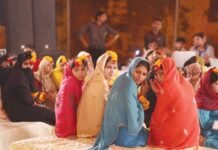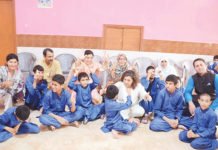The ongoing Cogito Youth Performing Arts Festival (CYPAF), due to end Jan 21 (tomorrow), provided the much needed break in the midst of a highly charged political scene of the country last whole week. Two of its prime events – the Literary Open Mic Night and the Comedy Workshop – especially lightened up the mood of the Lahoris who had gathered at The Knowledge Factory, DHA, the venue for the festival.
Sponsored by the US Consulate General, Lahore, the CYPAF featured a number of events, punctuated with over 20 workshops – the last one, Improvisational Workshop is to close the event.
For the uninitiated, Cogito is a youth-based theatre production company that has collaborated with different civil society bodies to promote arts in the country.
While some of the festival workshops were widely attended, that of comedy lacked participation most evidently – not to say, surprisingly. Shehzad Ghias Sheikh, head of the event, and the writer-director of last year’s hilarious theatre production Shakespeared, attributed this to a “lack of quorum” and also “a dearth of comedians and people who take comedy seriously.” (Read a detailed chat with Ghias Sheikh in the box below)
On another day, Zahid Ummar, an underground musician, gave an enthralling live performance while a young, excited crowd lapped up to every word he sang on heartbreak and celebration of love.
A theatre and acting workshop, conducted by Shah Fahad, a FAST graduate and founder of Dramaducation, focused on developing teamwork. Some 15 people took part in the workshop which “brought us closer – literally,” said a participant, “as the exercises often required us to shed our inhibitions and get into a kind of physical proximity.”
Shah Fahd had an explanation: “Confidence is key to acting, so it’s important for people [attending such workshops] to come out of their comfort shells and show the confidence to try out new things.”
A change in mood was in store for a small but charged crowd of people as the Literary Open Mic Night kicked off with Maham Suhail reading out her poem, titled, ‘That Dream-like State,’ which depicted the relation between the poet and her “mental and physical spaces.”
Suhail also recited an Urdu poem, titled ‘Dua – Eik Pareshaan Sawaal,’ which is a plea to God to pull her out of despair. “This one I wrote sometime last year, while I was still in a ‘dream-like state’,” she explained. “You can also find a streak of Sufi philosophy in it.”
Next, Fakhra Hassan, who is not new to Lahore’s literary circles, read out her poem ‘Boxes’ highlighting such hardcore socio-political issues as massacre, genocide and rape. However, the poem ended on a positive note – that of survival.
“It is basically about the relationship between the oppressor and oppressed in a capitalist society,” she said, in her epilogue.

Hassan was followed by Raza Naeem who gave a rendition of Saadat Hasssan Manto’s letter in a very interesting style. Naeem also successfully tried to place these letters in their context, shedding light on the many facets of the great Urdu short story writer of the century.
He went on to a hilarious Punjabi verse on “Zardari”, leaving everyone in splits. His witty liners and inimitably animated voice worked well to heighten the mood of the poem.
Gulnaar Tabassum, another relatively known poet, recited two of her Urdu nazms. Her work deserves a special mention also because she was the most senior participant in the group.
Lastly, Ahmad Shah Durrani made a heartfelt reference to the Soviet-Afghan war in his poem that he called a labour of love. “Life is a wonderful gift of God and we must celebrate it,” he said.
All in all, it was an inspiring night in terms of selection of poetry and prose and the unprejudiced response of the crowd that came – and left – in good spirits.




































